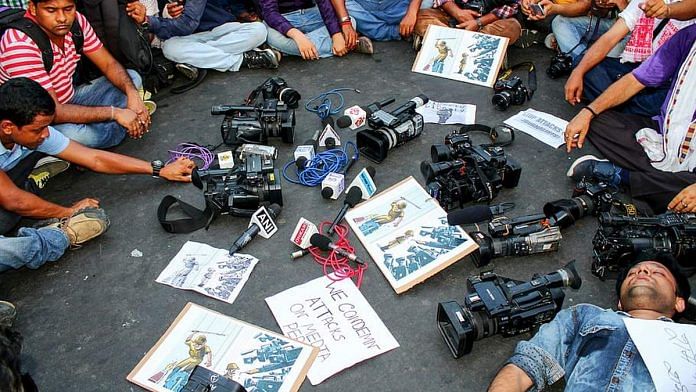New Delhi: On World Press Freedom day, India’s press freedom ranking fell to 150th out of 180 countries, from 142nd last year, according to Reporters Without Borders (RSF).
RSF published its 20th World Press Freedom Index Tuesday. In a report titled ‘India: Media freedom under threat’, RSF, along with nine other human rights organisations, further urged Indian authorities to “stop targeting journalists and other online critics for their work”.
The 2022 edition of the index assesses the state of journalism in 180 countries and territories, highlighting the “disastrous effects of news and information chaos — the effects of a globalised and unregulated online information space that encourages fake news and propaganda,” said RSF, an international non-profit and non-governmental organisation that “defends the right of every human being to have access to free and reliable information”.
India’s position has been consistently falling in the index since 2016 when it was ranked 133. Among India’s neighbours, Nepal is ranked at 76, Sri Lanka at 146, and Pakistan at 157.
“The authorities’ targeting of journalists, coupled with a broader crackdown on dissent, has emboldened Hindu nationalists to threaten, harass, and abuse journalists critical of the Indian government, both online and offline, with impunity,” RSF’s report on India said.
Among other factors, the report cited the filing of “spurious terrorism and sedition charges” against journalists, and raids on media houses by law enforcement and investigative agencies. It also discussed the Indian government’s alleged use of the Israeli-produced spyware Pegasus to snoop on journalists, and the risk of prosecution under the Information Technology Act and IT Rules of 2021.
Focussing on the “intensified crackdown” in Jammu and Kashmir after the abrogation of Article 370 in 2019, the report referred to the use of the Jammu and Kashmir Public Safety Act to detain journalists. It also discussed to the frequent internet shutdowns in the Union territory, saying that these particularly hampered journalists’ ability to access and disseminate information online.
The report also highlighted Uttar Pradesh, where it said criminal cases had been filed against 66 journalists and that allegedly, another 48 were physically attacked since Chief Minister Yogi Adityanath came to power in 2017. It claimed that the state had repeatedly filed false charges against those who published content and social media posts critical of the government.
“Siddique Kappan, another Muslim journalist, has been in prison since October 2020, when Uttar Pradesh Police arrested him on baseless charges of terrorism, sedition, and promoting enmity between groups, among others. At the time of his arrest, Kappan had been on his way from New Delhi to Hathras district in Uttar Pradesh to report on a gang rape and murder case of a young Dalit woman that had sparked nationwide protests,” the report said.
Other examples listed by the report included the operation of the fake auction app, ‘Bulli Bai’, which was used to ‘sell’ female Muslim journalists and in turn “humiliate, degrade, and intimidate them”. It further said that women journalists critical of the government face a growing backlash on social media, including rape and death threats. “The abuses often come from account holders who identify themselves as BJP supporters,” it alleged.
In 2021, India’s ranking had stayed the same as the year before, and it was termed “one of the most dangerous countries for journalists.” Press restrictions during the Covid crisis,the extended ban on the internet in Jammu and Kashmir, and allegedly arbitrary suspension of Twitter accounts of those speaking against the government, were given as evidence of the government tightening its grip on media — allegations that were denied by the Centre.
The organisations that contributed to the report included the Committee to Protect Journalists, Freedom House, PEN America, Reporters Without Borders, International Federation of Journalists, CIVICUS, Access Now, International Commission of Jurists, Amnesty International, and Human Rights Watch.
Also read: Slipping since 2014, India ranks 119 out of 165 in Human Freedom Index by US-Canada think tanks



